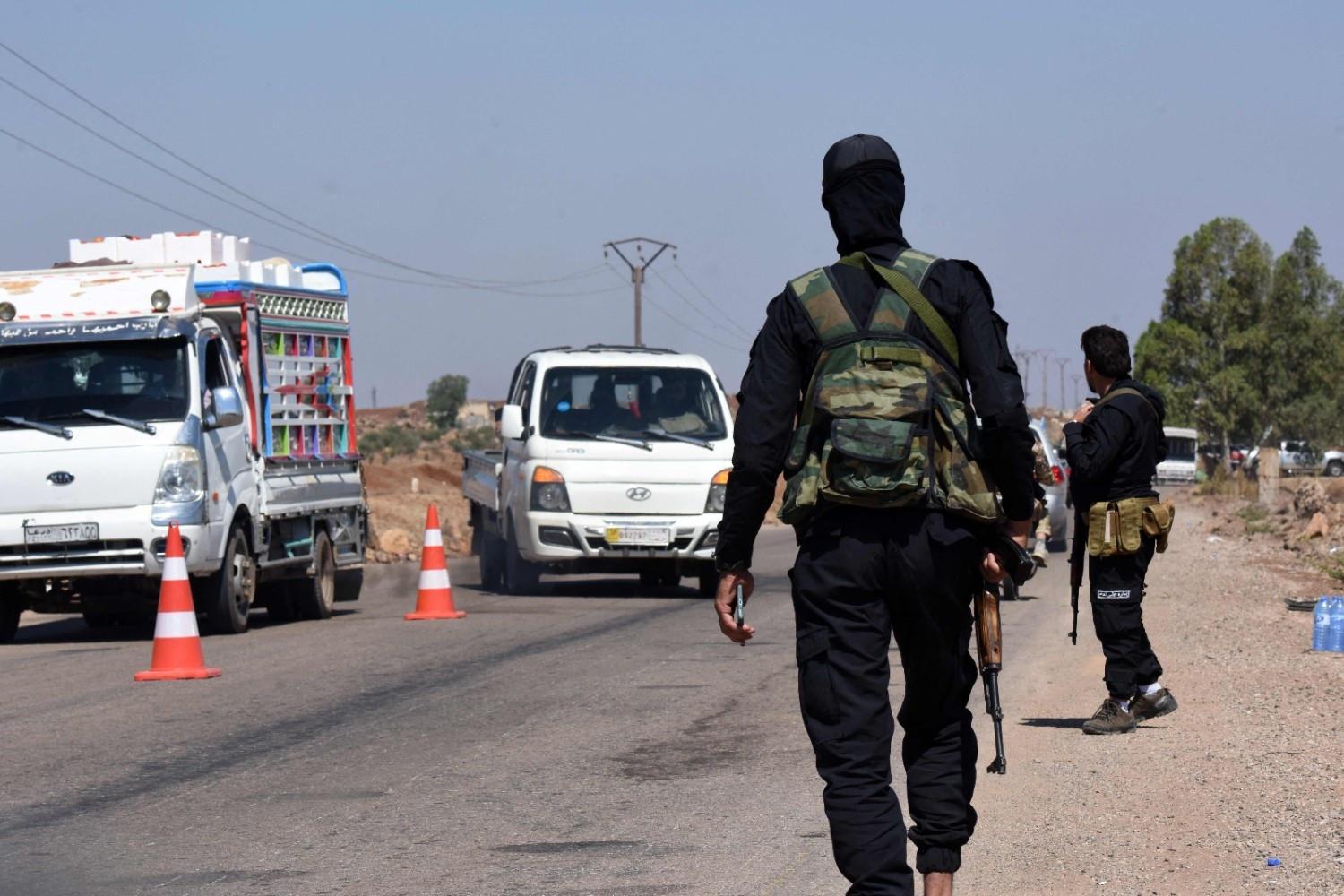
- Syrian government security forces man a checkpoint, to prevent Beduin tribal fighters from reaching the city of Sweida, along a road in southern Syria's Sweida province on July 19, 2025.
Syrian interior ministry forces began deploying in Sweida on Saturday under a U.S.-brokered deal intended to avert further Israeli military intervention in the Druze-majority province.
Israel had bombed defense ministry forces in both Sweida and Damascus earlier this week to force their withdrawal after they were accused of summary executions and other abuses against Druze civilians during their brief deployment in the southern province.
More than 900 people have been killed in Sweida since Sunday as sectarian clashes between the Druze and Sunni Bedouin drew in the government, Israel and armed tribes from other parts of Syria.
The office of interim President Ahmed al-Sharaa announced an "immediate ceasefire" in Sweida which it called on "all parties to fully respect".
The death toll from violence in Sweida has risen to 940 since last weekend, a war monitor said, despite the announcement of a ceasefire.
The Syrian Observatory for Human Rights said the dead included 326 Druze fighters and 262 Druze civilians, 182 of whom were "summarily executed by defense and interior ministry personnel".
They also included 312 government security personnel and 21 Sunni Bedouin, three of them civilians who were "summarily executed by Druze fighters". Another 15 government troops were killed in Israeli strikes, the Observatory said.
But AFP correspondents in and around the city reported gunfire and sporadic rocket fire and explosions as Druze fighters battled armed Bedouin who had seized some neighbourhoods on Friday with the support of volunteers from other parts of Syria.
The Observatory, a Britain-based war monitor, said the armed volunteers had been deployed with the support of the Islamist-led government although an AFP journalist said security personnel were manning checkpoints on Saturday to prevent further reinforcements getting through.
Druze fighters said the volunteers were mostly Islamists, who advanced to shouts of "Allahu Akbar (God is Greatest)".
One armed tribesman told AFP he had come to fight against the Druze clergy and their "pig followers".
"Today we came to their homes and we will slaughter them in their homes," he said.
The deal between theSyrian government and Israel was announced by Washington early on Saturday Damascus time.
U.S. pointman on Syria, Tom Barrack, said interim President Ahmed al-Sharaa and Israeli Prime Minister Benjamin Netanyahu "have agreed to a ceasefire" negotiated by the United States.
Barrack, who is U.S. ambassador to Ankara, said the deal had the backing of Türkiye, a key supporter of Sharaa, as well as neighbouring Jordan.
"We call upon Druze, Bedouins and Sunnis to put down their weapons and together with other minorities build a new and united Syrian identity in peace and prosperity with its neighbours," he wrote on X.
The U.S. administration, which has sided with Türkiye and Saudi Arabia in forging ties with the Islamist president despite his past links with Al-Qaeda, was critical of its Israeli ally's air strikes on Sria earlier this week and had sought a way out for his government.
Sharaa followed up on the U.S. announcement with a televised speech in which he renewed his pledge to protect Syria's ethnic and religious minorities.
"The Syrian state is committed to protecting all minorities and communities in the country... We condemn all crimes committed" in Sweida, he said.
The president paid tribute to the "important role played by the United States, which again showed its support for Syria in these difficult circumstances and its concern for the country's stability".
He also thanked Türkiye and Arab countries for their support.
The Syrian Observatory for Human Rights, a Britain-based war monitor, said at least 718 people had been killed since Sunday.
They included 146 Druze fighters and 245 Druze civilians, 165 of whom were summarily executed.
The monitor said 287 government troops and 18 Bedouin fighters were also killed along with three Bedouin "who were summarily executed by Druze fighters".
Fifteen more government troops were killed in Israeli air strikes.
In the corridors of the city's main public hospital, a foul odour emanated from the swollen and disfigured bodies piled up in refrigerated storage units, an AFP correspondent reported.
A small number of doctors and nurses at the hospital worked to treat the wounded arriving from the ongoing clashes, some in the hallways.
Doctor Omar Obeid told AFP that the hospital had received "more than 400 bodies" since Monday morning.
"There is no more room in the morgue. The bodies are in the street," he added.
The International Committee for the Red Cross warned that health facilities were overwhelmed, with power cuts impeding the preservation of bodies in overflowing morgues.
"The humanitarian situation in Sweida is critical. People are running out of everything," said Stephan Sakalian, the head of the ICRC's delegation in Syria.
The International Organization for Migration said 79,339 civilians had fled the fighting.